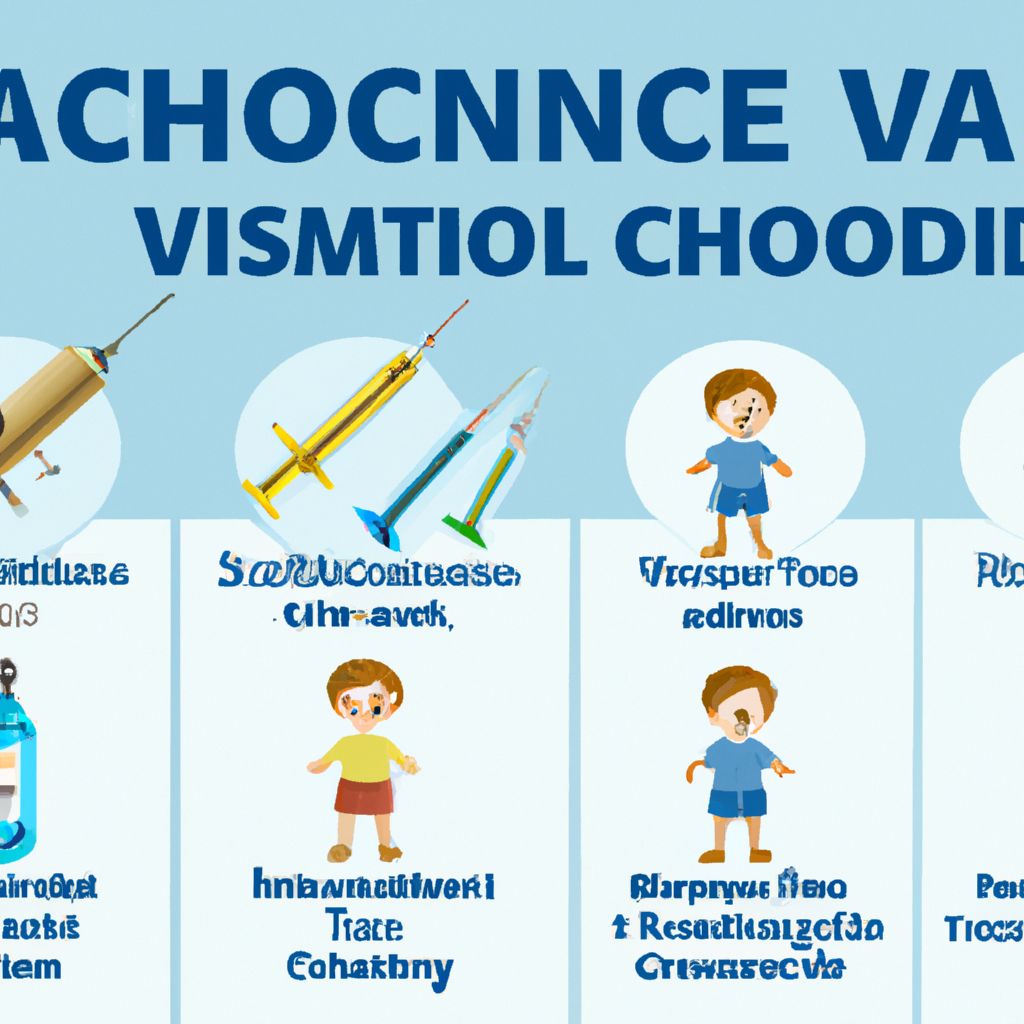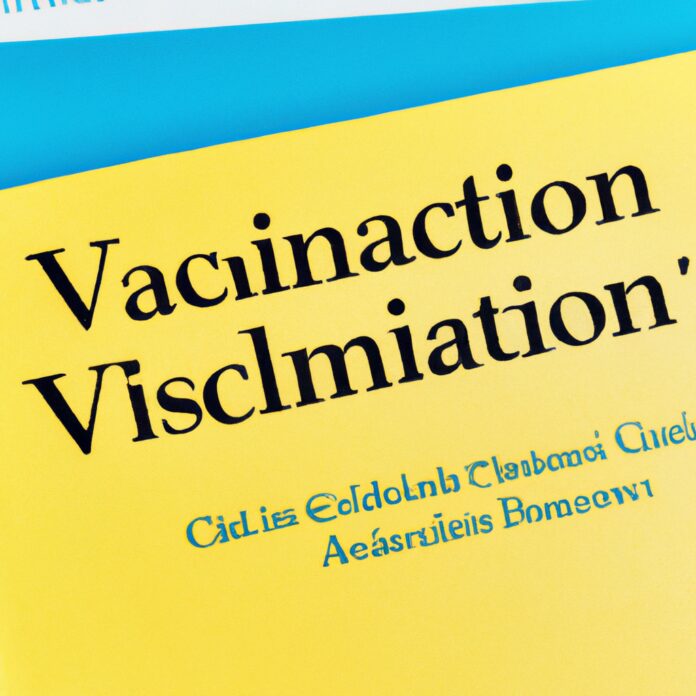Once upon a time, in a world filled with curious little beings, a magical shield emerged to protect them from the shadows of dreadful diseases. This mystical shield, known as childhood vaccinations, boasts the power to safeguard our beloved children and pave their way towards a brighter, healthier future. In this enchanting article, we embark on a journey through the realms of vital information, exploring the wonders and significance of childhood vaccinations. Delve into this magical realm with an open heart and an eager mind, for the knowledge that awaits holds the key to unravel life’s most captivating secret: how to shield our children from the perils that lurk in the shadows. Brace yourselves, dear readers, as our adventure begins, revealing the essential information necessary to protect our cherished little ones.
1. Preserving the Future: Understanding the Importance of Childhood Vaccinations
Vaccinations have been a crucial cornerstone of public health for decades, safeguarding future generations from preventable diseases. This wondrous medical innovation helps protect children from serious illnesses, laying the groundwork for a healthier and happier future. By understanding the importance of childhood vaccinations, we can collectively preserve the well-being of our communities and ensure the longevity of our society.
Benefits of childhood vaccinations: Vaccines offer numerous benefits that extend beyond individual protection. They create a shield of immunity that curbs the spread of infectious diseases, reducing the likelihood of outbreaks and epidemics. Additionally, childhood vaccinations contribute to public health efforts by lowering healthcare costs, alleviating strain on medical resources, and safeguarding vulnerable populations who are unable to receive immunizations themselves.
Intertwined global impact: The significance of childhood vaccinations transcends geographical boundaries. Through widespread immunization, communities not only protect their own children but also play a pivotal role in building a safer world. By halting the transmission of diseases across borders, we can collectively diminish the global burden of illness, making a positive and lasting impact on societies worldwide.
Dispelling myths and addressing concerns: In recent years, misinformation surrounding childhood vaccinations has spread through various channels. It is crucial to address these misconceptions head-on, relying on scientifically-backed evidence and expert advice. Dispelling myths and addressing concerns with clarity and empathy can help build trust, ensuring that parents feel confident in making informed decisions about their children’s immunizations.
In conclusion, understanding the importance of childhood vaccinations is paramount to preserving the future. By recognizing the benefits of vaccinations, acknowledging their global impact, and addressing concerns and misinformation, we can collectively work towards a healthier and safer world for generations to come.
2. Nurturing Immunity: The Science Behind Childhood Vaccinations
Vaccinations are a cornerstone in safeguarding our children’s health, providing a solid defense against a range of infectious diseases. Delving into the science behind childhood vaccinations unveils the marvels of our immune system and the remarkable interventions that fortify our body’s natural defense mechanisms.
The Immune System: A Complex Arsenal
Our bodies are equipped with a sophisticated immune system that acts as a shield against harmful pathogens. Consisting of various specialized cells and organs, the immune system works tirelessly to detect and neutralize foreign invaders, preventing illness and aiding recovery. Vaccinations capitalize on this incredible defense network by exposing the immune system to harmless fragments or weakened forms of disease-causing agents.
Building Long-term Immunity
Childhood vaccinations play a crucial role in the long-term immunity of our little ones. By mimicking the presence of a real infection, vaccines stimulate the immune system to produce a specific response against particular diseases. This response typically includes the development of protective antibodies, which help to recognize and destroy the targeted pathogens.
Key Benefits of Vaccinations:
- Disease Prevention: Vaccines equip the immune system with knowledge and defense strategies to fight off infections effectively, greatly reducing the risk of contracting diseases such as measles, polio, or whooping cough.
- Public Health Impact: Widespread vaccination programs have historically led to the eradication or significant reduction of various diseases, ensuring the safety of entire communities.
- Safe and Reliable: Vaccinations undergo rigorous testing and monitoring, adhering to strict safety standards to ensure their effectiveness and minimize potential side effects.
- Life-Saving Potential: Vaccinations have the power to save lives, averting severe complications or even fatal outcomes in susceptible individuals.
Conclusion: Protecting Future Generations
Understanding the science behind childhood vaccinations reinforces the importance of immunization in safeguarding the health and well-being of our children. By nurturing our immune systems through these interventions, we empower our young ones with the ability to combat infectious diseases, protecting not only their own lives but also paving the way for healthier future generations.
3. Safeguarding our Little Ones: Exploring the Benefits of Childhood Vaccinations
Vaccinations have revolutionized the field of pediatric healthcare, providing numerous benefits for the well-being of our little ones. Here are some compelling reasons why childhood vaccinations are a crucial aspect of safeguarding our children:
1. Disease Prevention
Childhood vaccinations play a pivotal role in preventing a wide range of diseases, some of which can have severe consequences or even prove fatal. By immunizing our children, we can shield them from illnesses such as polio, measles, mumps, rubella, hepatitis, and many others. Vaccinations significantly reduce the risk of infection and contribute to diminishing the spread of these diseases within our communities.
2. Strengthening Immunity
Immunizations work by stimulating the body’s immune system to recognize and fight specific disease-causing agents. By receiving vaccines during childhood, children develop immunity against potentially life-threatening diseases, building a defense system that protects them throughout their lives. Vaccinations not only safeguard the individual but also contribute to herd immunity, ensuring the vulnerable members of our society who cannot be vaccinated are protected as well.
3. Cost-Effective Healthcare
Childhood vaccinations provide tremendous long-term cost savings. By preventing diseases, vaccines help reduce medical expenses associated with treatments, medications, and hospitalizations. Furthermore, they help minimize the economic burden on families as vaccination is often covered by insurance or available at low or no cost through various public health programs. Investing in childhood vaccinations not only secures the well-being of our children but also promotes affordable healthcare for all.
4. A Shield Against Invisible Threats: Debunking Common Misconceptions about Childhood Vaccinations
Vaccinations are a powerful shield that protect our children from a wide range of preventable diseases. However, there are several misconceptions surrounding childhood vaccinations that have led to misinformation and, at times, unnecessary fear. Let’s address some of the most common misconceptions, setting the facts straight to ensure parents can make informed decisions about their child’s health.
1. Vaccines Cause Autism
This myth, stemming from a now-debunked study, has been thoroughly discredited by numerous scientific studies, including those conducted by the respected Centers for Disease Control and Prevention (CDC). Extensive research has shown that there is absolutely no link between childhood vaccinations and autism. Vaccines are a safe and vital tool in preventing serious illnesses, and the benefits substantially outweigh any nonexistent risks.
2. Vaccines Overwhelm the Immune System
Contrary to the misconception that vaccines may overload a child’s immune system, the reality is quite the opposite. Our immune system is constantly exposed to countless bacteria and viruses in our environment. Vaccines, which contain weakened or killed forms of pathogens, help strengthen the immune system by mimicking natural infections without causing the actual disease. This enables the body to recognize and fight off future encounters with the same pathogen more effectively.
3. Natural Immunity is Better
While natural immunity acquired through contracting a disease may provide some protection, it comes at a significant cost. Vaccines offer a safer and more reliable way to develop immunity without the potential risks and complications associated with the diseases themselves. The controlled exposure to weakened pathogens in vaccines allows the immune system to prepare and respond, leading to the development of long-lasting and robust immunity.
It is crucial to separate fact from fiction when it comes to childhood vaccinations. By debunking these myths, we can ensure that our children are protected from harmful diseases and pave the way for a healthier future.
5. A Lifelong Gift: Unraveling the Long-term Impact of Childhood Vaccinations
Childhood vaccinations have long been hailed as a crucial step in ensuring a healthy future for our little ones. While their immediate benefits are well-known, the long-term impact of these vaccinations has been an intriguing subject for researchers.
It is undeniable that childhood vaccinations have revolutionized modern medicine, significantly reducing the risk of infectious diseases that once plagued our societies. The gift of immunization has protected countless lives, preventing severe complications, disabilities, and even mortality. But it doesn’t end there. Recent studies have shed light on the unexpected lifelong advantages that childhood vaccinations bring.
Research suggests the following long-term benefits of childhood vaccinations:
- Reduced risk of allergies: Vaccinations have been linked to a lower risk of developing allergies, including hay fever, asthma, and eczema.
- Protection against certain cancers: Some vaccines, such as those targeting human papillomavirus (HPV) and hepatitis B, have demonstrated their role in preventing specific types of cancers later in life.
- Increased cognitive development: Vaccinations have been associated with improved cognitive function and better academic performance in children.
- Improved overall health: By preventing diseases, vaccines contribute to overall better health and well-being throughout a person’s lifespan.
The potential long-term impact of childhood vaccinations continues to capture the attention of scientific communities worldwide. As research advances, our understanding of the lifelong benefits provided by these vaccination programs grows, reaffirming their status as a precious gift for generations to come.
6. Empowering Parents: Making Informed Decisions about Childhood Vaccinations
As a parent, making decisions about your child’s health is one of the most important responsibilities you have. When it comes to childhood vaccinations, it can be overwhelming to sort through the vast amount of information available. We understand that you want what’s best for your child, so we’re here to empower you with the knowledge you need to make informed decisions.
Here are some key points to consider:
- Consult with healthcare professionals: Reach out to your child’s pediatrician or healthcare provider to discuss the recommended vaccination schedule and any concerns you might have. They can provide expert advice tailored to your child’s unique needs.
- Separate fact from fiction: In today’s digital age, misinformation can spread rapidly. Make sure to rely on reputable sources such as national health organizations or government agencies for accurate information on vaccines.
- Weigh the risks and benefits: Vaccines are thoroughly tested for safety and effectiveness before they are approved for use. Consider the potential risks of not vaccinating your child, such as leaving them vulnerable to serious diseases, versus the minimal risks associated with vaccines.
- Explore vaccine myths and misconceptions: Addressing common misconceptions about vaccines can help dispel fears and provide clarity. Learn about the science behind vaccinations, including how they work and why they are crucial for preventing the spread of infectious diseases.
Remember, making informed decisions about childhood vaccinations is essential for your child’s well-being and the overall health of the community. By staying well-informed and seeking advice from trusted sources, you can confidently protect your child from preventable diseases.
7. Community Immunity: Solidifying the Case for Universal Childhood Vaccination
Vaccinations have long been hailed as one of the most effective public health interventions, safeguarding individuals and communities from dangerous infectious diseases. This holds particularly true for childhood vaccinations, which not only protect young ones but also contribute to the concept of community immunity. Also known as herd immunity, this phenomenon occurs when a significant proportion of a population is immunized against a specific pathogen, reducing its ability to spread and harm vulnerable individuals.
Here are some compelling reasons why universal childhood vaccination is crucial in maintaining community immunity:
- Protecting the Unvaccinated: Some individuals cannot receive vaccinations due to medical reasons, such as those with weakened immune systems or allergies. By ensuring the majority of the population is vaccinated, we create a shield that safeguards these vulnerable individuals from contracting diseases they cannot be protected against themselves.
- Preventing Outbreaks: Vaccinations significantly disrupt the transmission of infectious diseases, reducing the likelihood of outbreaks. Diseases that were once widespread, such as polio and measles, have been successfully contained through widespread childhood immunization programs. This not only protects individuals but also prevents the reemergence of such diseases within communities.
- Stopping Pathogen Circulation: Immunizing children breaks the cycle of infection for pathogens, preventing their circulation within our communities. Without adequate vaccination coverage, these diseases can quickly gain momentum and pose a threat to public health. Universal childhood vaccination helps break this cycle and creates a strong barrier against the spread of infectious diseases.
Community immunity is not only a testament to the effectiveness of vaccines but also a collective responsibility to protect the vulnerable members of our society. By embracing universal childhood vaccination, we strengthen the health and safety of our communities, ensuring a brighter and healthier future for generations to come.
As we conclude this informative journey on childhood vaccinations, we embark on a collective mission to safeguard our children’s health, weaving a web of protection that spans beyond our own grasp. The vital knowledge we have garnered here empowers us as guardians, equipping us with the necessary understanding to make educated decisions.
In this intricate dance between science and compassion, we have explored the wonders of vaccines, their remarkable ability to fortify our little ones against diseases once feared. We have unraveled the intricate tapestry of benefits that lie within every tiny vial, where centuries of research and dedication converge to provide a safer world for our children to thrive.
Our exploration has provided clarity where misconceptions may have lingered – the humble whispers of misinformation, now cast away by the resounding chorus of scientific consensus. We have learned that vaccinations generate a shield of protection not only around our own offspring but around the collective community, bridging gaps and erasing boundaries. Together, we embrace the beauty of herd immunity, knowing that every child we safeguard becomes a beacon of health for countless others.
But let us not rest on this newfound knowledge alone. In our neutral yet creative pursuit, we acknowledge that the road ahead is not without its complexities, nor without concerned voices that deserve to be heard. We invite an open dialogue that fosters understanding, as we extend a compassionate space in which questions can be asked, tensions embraced, and fears acknowledged.
In this tapestry of information and empathy, we weave a narrative that is inclusive and encompassing of all viewpoints, driven by our shared desire to protect and nurture our children. While respecting personal choices, we remain steadfast in our commitment to ensure that our youngsters enjoy the beauty of a healthy childhood—a tapestry where opportunities blossom, potential flourishes, and dreams take flight.
As we part ways for now, we carry with us the essence of this article—a humble reminder that knowledge is power, that compassion spurs unity. Let it be a guiding light on our journey as we navigate the ever-evolving landscape, ever-committed to weaving threads that safeguard the innocence, joy, and resilience of childhood.
Together, let us embrace the power of vaccines, standing firm in our resolve to protect our most precious beings. For in safeguarding their health, we forge paths towards brighter tomorrows, where laughter, curiosity, and boundless wonder reign supreme.
Until we meet again, let us march forward, armed with knowledge, empathy, and the unwavering commitment to build a safer, healthier world for our children.





